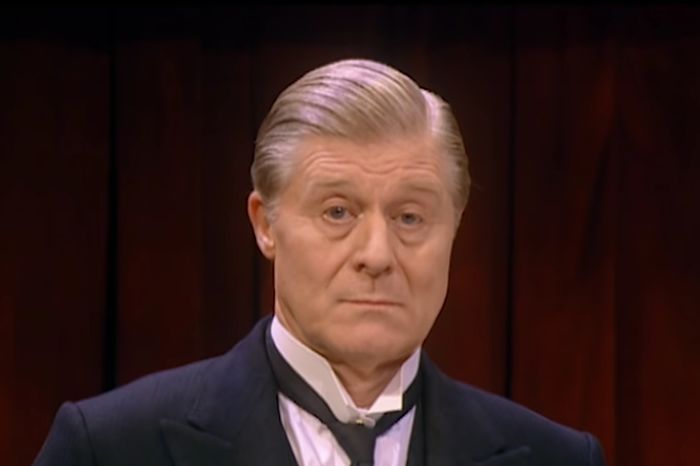
Outside my window, spring is here. The leaves on the honey locust are unfurling at last; the mourning doves are cooing. And as the season wakes, so do my slumbering critical faculties. I find myself strangely grateful to Andrew Lloyd Webber and Alan Ayckbourn’s shabby-to-rotten musical By Jeeves, broadcast on Webber’s YouTube outlet, The Shows Must Go On. Because as rough as last evening was, and maybe because it was so rocky, a terrible production made life seem momentarily normal. Since the shutdown, my emotional investment in every available streamed performance has been wildly outsized: I’ve teared up over readings, clutched an Instagram Live ukulele concert metaphorically to my chest, been touched deeply by shows archived and new. Good and bad had stopped having meaning. And then last night, bad came roaring back.
It’s not necessarily news that By Jeeves is disappointing. Webber loved the idea of adapting P.G. Wodehouse’s classic characters so much that he overcame an insta-flop 1975 debut (a version called Jeeves closed in a single month) and totally reworked it in the mid ‘90s. It arrived on Broadway in October of 2001, a time when a comedy might have been met with some gratitude. But By Jeeves went bye-bye before the end of that year — its interchangeable characters, narrative incoherence, boneless approach to farce, gluey songs, and air of desperation had not been the balm its makers hoped.
The filmed version captures aspects of the Broadway production (itself a transfer from Goodspeed Opera House) that surely no one should have preserved. For instance, the musical’s framing device — Bertie Wooster (John Scherer) presents a banjo concert at a “church hall” filled with the actual audience — is re-created, with a roomful of extras watching Bertie’s capers. Even though these costumed banjo-aficionados are part of the TV movie, they still re-create the atmosphere of a big group not liking something. Directors Ayckbourn and Nick Morris sometimes cut to a reaction shot, catching pained grins and uncomfortable seat-shifting. The “this is going poorly” vibe is part of the joke for the first few minutes: Since Bertie’s banjo has disappeared, he’s forced to tell an anecdote from his mishap-prone life. But even after those 25 minutes of false beginnings, people warm slowly to the action. By the end, they’re laughing and nudging as a farce’s audience should, but it’s been too long in a too-quiet room. We’ve heard how they feel.
Once embarked upon, By Jeeves’s action is a triangle of confused identities. Bertie and his co-narrator, the unflappable servant Jeeves (Martin Jarvis), tell us about a day when Bertie, caught flat-footed at a disciplinary hearing for his public rambunctiousness, lies to a magistrate (Heath Lamberts) about his name, claiming to be Gussie Fink-Nottle. The real Gussie (played by James Kall), however, is trying to win favor with his beloved’s father — coincidentally the same magistrate — and so has assumed Bertie’s name. Symmetry! What could be easier? Events conspire, however, to bring the two men to the magistrate’s home Totleigh Towers, where a third hapless goof named Bingo Little emerges, whose name Bertie appropriates when the game seems up at the end of Act I. Various women allow their affections to be won and then lost by these face-pulling shamblemonkeys, and only a faked burglary (Bertie wears a pig mask), a whisk through a country-house maze, and a humiliated American named Cyrus Budge (Steve Wilson) can put all the couples right.
Or rather, it’s Jeeves who puts things right. Limply, despite having all Wodehouse’s plots to draw from, Ayckbourn and Webber make the valet-ex-machina moment into a theatrical trick—as narrator, Jeeves calls a pause in the action and physically moves Budge into a position where he will be unmasked as the burglar. Why is that such a bummer? First, after watching a puzzle-box play, it’s depressing to watch the puzzlemaker smash the box. And second, something crucial to Wodehouse’s spirit is lost. In the roughly sourced novel The Code of the Woosters, Jeeves is, in his scrupulously dignified way, a blackmailer and threatener, using shame and the fear of exposure to keep the lid on all Bertie’s scandals. Wodehouse is crisp on the page because Jeeves is pure ice. On stage, though, Jeeves is all too tepidly human. He’s an audience surrogate, looking down his nose quellingly at Bertie’s idiocies; he’s an eye-rolling stage-manager, providing deliberately ramshackle props. In the book, the gag is that Jeeves is omnipotent, and any god — especially one willing to help an arrogant buffoon — should strike terror. This guy is just efficient.
Ayckbourn, who ought to have known better, takes P.G. Wodehouse’s vodka-gimlet prose and turns it into soda pop. “Banjo boy, banjo boy, play that banjo for me,” goes one lyric, forgettably, in one of Webber’s same-sounding pastiches. “By shuttlecock! By croquet hoop! By Panama! By Windsor Soup!” goes another, a paean to Jeeves, and, apparently, nouns. There is one song, though, that I can recommend. Scroll to minute 41:25, when Donna Lynne Champlin enters the scene as Bertie’s ex-fiancée Honoria Glossop. The camera gets close to her and instead of looking tense, her eyes gleam with chaotic energies. Honoria asks Bertie to give her a ride to Totleigh Towers, and as they motor along, she sings “That Was Nearly Us,” hinting that she’s still willing to play hen to his Wooster. Champlin gives the song an art-song edge, a plumminess that shades from comedy into beauty and back again. Was that one wonderful performance worth enduring two hours and twenty minutes of effortful unfunniness? No, not exactly. Bizarrely, though, it made me realize I’ve even missed the eat-your-spinach parts of being a critic. This suddenly was the familiar experience of seeing shows, the bad ones of which could be so embarrassing and painful. In the worst, I felt pinned to my seat, unable to run away, thinking yearningly of the exit. There would be times, though, when a performer would see something in the mess and hold it up to catch the sun. It was nice to remember that pearls found that way do gleam particularly bright.



